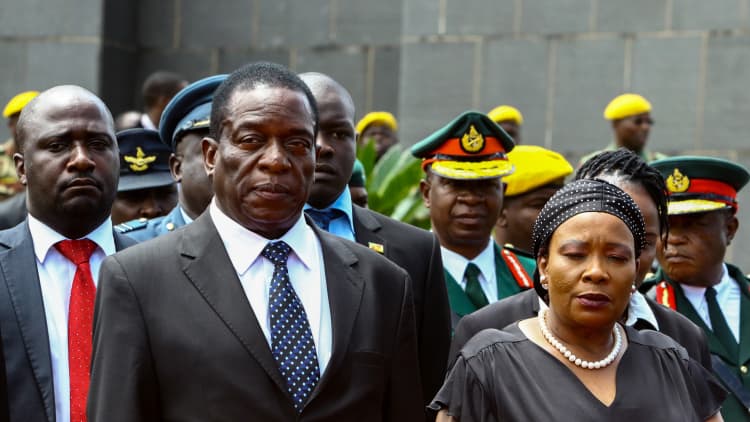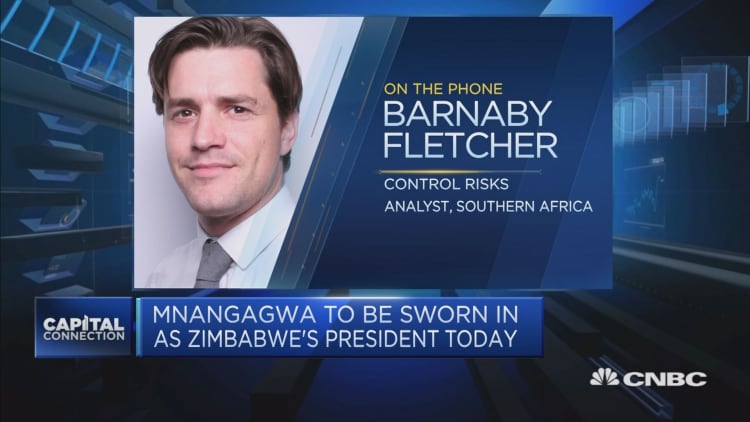Zimbabwe's ousted former President Robert Mugabe said he doesn't hate his successor Emmerson Mnangagwa, but added that his position in office is illegal.
"I don't hate Emmerson, I brought him into government. I would want to work with him. But he must be proper, he is improper where he is. Illegal," Mugabe told South Africa's SABC News Thursday in his first televised interviews since his resignation in November 2017.
Mnangagwa succeeded Mugabe in November, following a turbulent week in which the military took control of the country and placed Mugabe under house arrest. He resigned as parliament began the process to impeach him, news of which led to a jubilant response on the streets of Zimbabwe. Mugabe insisted in SABC's interview that a coup d'etat had taken place.
Mugabe also said that he never thought that Mnangagwa, who was his protege, his deputy president and also a member of the ZANU-PF party, would act against him.

"I never thought he whom I had nurtured and brought into government and whose life I worked so hard in prison to save as he was threatened with hanging, that one day he would be the man who would turn against me," Mugabe said.
Mnangagwa, whose nickname is "The Crocodile," was convicted for guerrilla warfare under white minority rule and sentenced to death in 1965, but his life was eventually spared as he was a minor when he committed the crime.
Mugabe's own time in power was marred by economic mismanagement, resulting in hyperinflation, and violent suppression of opponents. He assumed the presidency of the former British colony in 1987.
When questioned in a separate interview Thursday by the U.K.'s ITV News on whether he had ruined Zimbabwe's economic prosperity, Mugabe said: "Ruined? Of course not."
Mnangagwa's presidency has been characterized by his outward-looking approach thus far. He has endeavored to open up the former pariah state, touting the phrase "Zimbabwe is open for business."

"In three months, we have secured $3.1 billion worth of commitments from across the world," Mnangagwa said in the New York Times Sunday. In the article, he pledged to fight corruption in the country and establish "a new era of transparency, openness and commitment to the rule of law."
Mnangagwa also attended the World Economic Forum's annual conference in Davos, Switzerland, in January of this year.
Mugabe meanwhile called time on his own political ambitions. "I don't want to be president again. I'm 94," he told ITV News.
'Zimbabwe is open for business'
Zimbabwe is making enquiries to re-join the Commonwealth, Reuters reported earlier this week. Foreign Minister Sibusiso Moyo told Zimbabwean parliament that "there are necessary processes and consultations which are taking place," to join the group of 53 nations, most of which are former British colonies and could bring trade benefits.
Mugabe withdrew Zimbabwe from the group in 2003 after he was criticized over the fairness of elections and violence in the country.
Mnangagwa has said that he may ask the Commonwealth, the European Union and the United Nations to supervise Zimbabwe's presidential and parliamentary elections which are scheduled for this year, Reuters also reported.
"Mnangagwa hasn't had a lot of time to undo the previous administration's policies," Samir Shasha, chief executive of Zimbabwe-focussed investment firm Cambria Africa, told CNBC via telephone. But, "I strongly suspect that he will win without having to rely on intimidation," he added.
Zimbabwe's mining industry has also shown signs of renewal. According to Reuters, the country's mining minister announced at an investment conference in London Thursday that the sector had garnered roughly $300 million worth of investment. This would equal four times as much anticipated production in 2019, in comparison with last year.


